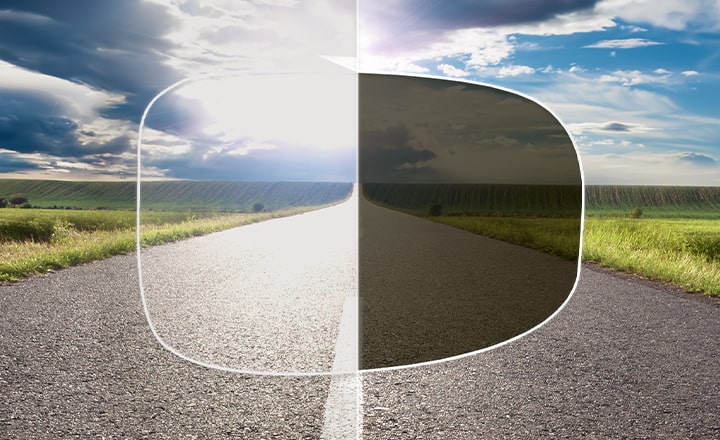Polarised lenses
Block reflected glare and prevent eye strain


Very often when you go outside, it can become extremely irritating when reflected light obstructs your view. For example, you might have noticed while walking along the beach on a sunny day, that beams of light reflecting off the waves can be particularly blinding. Or perhaps you were driving on a wet road and you noticed that light was reflecting off of nearby vehicles and wet surfaces making it hard for you to see. This can be very damaging to your vision and result in eye strain which polarised lenses help to safeguard you from. They have a laminated filter that blocks horizontal glare.
You can add polarised lenses to a wide range of our stylish frames. The only styles they aren’t available with are semi-rimless or rimless frames due to the risk of de-lamination.
What are polarised lenses?
When light reflects directly into your eyes, this is called glare. Polarised sunglasses are designed to reduce glare from reflective surfaces, which include water, snow, metal and glass. They also protect your eyes from harmful UV rays.
How do polarised lenses work?
When light reflects off a surface, the waves are often strongest horizontally, vertically, or diagonally. This can be defined as polarisation.
Polarised lenses have a light-filtering chemical added to them. The molecules are organised precisely to prevent parts of the light from passing through the lens. It works in a similar way to a blind hanging from a window. The light is only able to move through the openings of the blind. Polarised sunglasses only enable vertical light to enter your eyes. Any glare is removed as the horizontal light waves are unable to pass the vertical filter.
Our polarised lenses block 85% of the light passing through the lens. This means when you look through the lens you can still see clearly, but any brightness and glare are significantly reduced resulting in a comfortable visual experience and the avoidance of any eye strain. Our polarised lenses come in two colours. Brown is ideal for driving whilst grey makes colours appear more natural.
Benefits of polarised lenses
Blinding reflected glare is blocked and 85% of light is filtered out, easing eye strain for greater visual comfort.
Contrast is enhanced for improved visual clarity so you can see clearer.
Suitable for people with specific eye conditions that make them sensitive to light.
Complete protection from the sun’s harmful UVA/B rays.
What polarised lenses can be used for
Polarised sunglasses are very practical and have many different uses.
What are the disadvantages of polarised lenses?
There are just a few instances when polarised lenses might not be suitable.
Polarised lenses can make LCD screens appear distorted. Therefore, they will not be suitable for people who rely on them for work, especially pilots.
Also, it is important to be aware that it can make technology hard to see, specifically car dashboard controls, TV screens, mobile phones and cash machines. At this time, it may be a good idea to remove your polarised sunglasses.
Due to the fact that polarised lenses reduce the amount of light that enters the eye, these lenses are not suitable for use at night.
FAQs
How to order polarised sunglasses

1. Choose your frames
Browse a wide range of fashionable frames online (excluding semi-rimless or rimless frames) and add your favourites to your basket.

2. Select your lenses and package
Select your vision type and then choose sunglasses as your lens category. Pick polarised lenses and choose your preferred lens colour and one of our advanced lens packages.

3. Add your prescription
Enter your prescription or choose to send it later via email, phone, or post.

4. Enjoy your new polarised sunglasses!
Once your new sunglasses have been delivered to your door, you'll be able to wear them and show them off to everyone.




